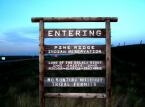Hannah Morgan > Sophomore > Journalism > University of Maryland, College Park
 Most college students spend their summers home from school sleeping in, relaxing by the pool, pulling a late-night shift at the neighborhood restaurant or babysitting unruly children. Gone are the stress-filled summers of high school where the pressure to fill up a resume with meaningful activities to impress college admissions officers kept students constantly occupied, volunteering and taking extra “college prep” courses. It is rare, then, to find college students home from school that maintain a busy lifestyle and continue to volunteer for projects they started in high school.
Most college students spend their summers home from school sleeping in, relaxing by the pool, pulling a late-night shift at the neighborhood restaurant or babysitting unruly children. Gone are the stress-filled summers of high school where the pressure to fill up a resume with meaningful activities to impress college admissions officers kept students constantly occupied, volunteering and taking extra “college prep” courses. It is rare, then, to find college students home from school that maintain a busy lifestyle and continue to volunteer for projects they started in high school.
Regina Cowell is one of these students. A junior sports and exercise and physical therapy major at Gannon University, Cowell has volunteered on the Pine Ridge Native American Reservation in southwest South Dakota for three summers.
Cowell works with teens from the reservation as a camp counselor with the Hau Kola Learning Camp system, an organization that sends volunteers from the Baltimore area to three different Native American reservations to run learning camps for children of all ages.
The Pine Ridge Native American Reservation is home to approximately 40,000 people, 97 percent of whom live under federal poverty levels, according to NativeVillage.org. The Web site also lists the teen suicide rate on the reservation as 150 percent higher than the national average.
Hau Kola Learning Camps runs three consecutive weeks of camp on the Pine Ridge Reservation’s Makasan location (a small church in rural South Dakota) for teenagers, elementary school students and preschoolers. Volunteers from Baltimore apply and go through an interview process to be selected to travel. Once on the reservation, volunteers work as counselors, organizing a week of camp for the children. For example, Cowell volunteers as a counselor of the work crew during teen camp.
“As part of this group, we take some of the teens that come to camp and do work projects on site or in the community,” she said. This year Cowell and her team worked on the Makasan church log cabin to rid it of rotten wood and replace broken air vents.
“I think the work crew is an important aspect to the learning camp because we try to teach the teens to take pride in the physical work they do, as well as giving back to their own community in a positive and enjoyable manner,” Cowell said. Teen campers can also work on a GIS map-making project or in a leadership group that trains the teens to be assistant counselors for the elementary or preschool camps.
Samantha Zito, a freshman biology major at Boston University is a counselor during elementary week. She shepherds a group of about 12 elementary school kids to different learning stations like math, science, technology, and the “book nook,” where campers are allowed to pick out and bring home as many books as they want, as there is not a public library on the reservation.
Zito, a dark-skinned and dark-haired Italian, remembers her first year at camp, “talking to some campers and one of them said, ‘you look like us but you are too weird to live here.’” Although the reservation is filled with much poverty and destitution, camp is filled with funny moments as well, which bond the counselors to the campers quickly and keep both groups coming back year after year.
Zito’s experiences have influenced her collegiate plans. “My South Dakota experiences have definitely influenced my plans for college and beyond. I want to take classes that focus on Native American history and life. I also want to study social justice,” Zito said after her fourth summer of camp. “The kids on the reservation keep me coming back.”
Counselors may not all travel to South Dakota for the same reasons, but they can all agree that the positive experiences they have had on the reservation are what draws them back.
“I continue to go to South Dakota because I love how awesome the kids are, despite the circumstances that they live under. Being out there just gives me a completely different outlook on life and I feel as though I find out something new about myself every time I go out there,” Cowell said.
Information from this year’s camps can be found on the Hau Kola website: haukolalearningcamps.org.
Images courtesy of nativeyouthmovement.org and nativeamericanministry.com.



















